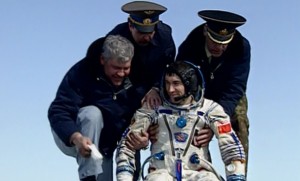Who was the last citizen of the USSR?
Obsessed with the 20th anniversary of the Soviet collapse, I watched a unique and astounding film. “Out of the Present” is a documentary about Soviet cosmonaut Sergei Krikalev, who became known as the last Soviet citizen because he was sent up to the Mir space station from the USSR in May 1991 only to return, 310 days later, in March 1992, to a different country-Russia. But the film, by Romanian director Andrei Ujica, is about so much more than space travel or the collapse of Communism. It’s a moving essay about perspective, the meaning(lessness) of politics, about humanity rising above history, and the idea of home.
 While Krikalev (left) was in space, the USSR had disappeared below him. Tanks rushed into the streets, Gorbachev resigned, the Soviet flag lowered forever. And yet, from the vantage point of his porthole above the atmosphere, with its view of rivers and mountains and shimmering city grids, all remained as it has always been.
While Krikalev (left) was in space, the USSR had disappeared below him. Tanks rushed into the streets, Gorbachev resigned, the Soviet flag lowered forever. And yet, from the vantage point of his porthole above the atmosphere, with its view of rivers and mountains and shimmering city grids, all remained as it has always been.
When the USSR collapsed, many of its former citizens felt like they had lost their home. But Out of the Present, subversively, or maybe reassuringly, puts the changes into a cosmic perspective.
Before beginning his re-entry, Krikalev is interviewed from aboard Mir by a Russian film crew, in the early spring of 1992.
The reporter asks: “When you left, the Soviet Union still existed, now it is Russia. Gorbachev was in power, now it’s Yeltsin. Even your home town of Leningrad is now St Petersburg. Which of these changes impresses you most, surprises you most?”
Here is Krikalev’s straightforward reply, made all the more mindblowing by its utter literalness:
“What surprises me most? That at first, the Earth was dark, and now it’s white. Winter has come, and before it was summer. Now, it’s beginning to bloom again. That’s the most impressive change you can see from space”.
Krikalev’s friend and fellow cosmonaut, Anatoly Artsebarsky (the guy with the box of Coke, above received from an incoming cargo spaceship), came to meet him at touchdown. Reporters asked him at what point does a cosmonaut really feels he is home?
Artsebarsky, wearing a Soviet military uniform that has suddenly become outdated, makes no mention of flags, towns, countries, even the sight of familiar people, or family.
“As soon as one breathes the Earth’s air through the open hatch”, he replies. “The smell of the earth – that’s the feeling of being home again”.
Through all the violent displacements of the last 20 years, it’s sometimes easy to forget that while names, politics, labels and even morals change, and no matter what horrors the country formerly known as the USSR has gone through, and will likely go through yet, it still smells of Earth; still passes each year from summer, into winter and spring again. And that is something that no revolution, no tragedy, can obliterate: a thought both maddening and sublime – that life goes on.